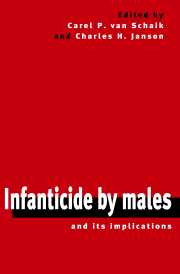Book contents
- Frontmatter
- Contents
- List of Contributors
- Foreword
- Infanticide by males: prospectus
- Part I Introduction
- Part II Infanticide by males: case studies
- Part III Behavioral consequences of infanticide by males
- Part IV Infanticide by females
- 17 Infanticide by female mammals: implications for the evolution of social systems
- 18 “The hate that love generated” – sexually selected neglect of one's own offspring in humans
- Part V Conclusion
- References
- Species index
- Subject index
18 - “The hate that love generated” – sexually selected neglect of one's own offspring in humans
Published online by Cambridge University Press: 04 November 2009
- Frontmatter
- Contents
- List of Contributors
- Foreword
- Infanticide by males: prospectus
- Part I Introduction
- Part II Infanticide by males: case studies
- Part III Behavioral consequences of infanticide by males
- Part IV Infanticide by females
- 17 Infanticide by female mammals: implications for the evolution of social systems
- 18 “The hate that love generated” – sexually selected neglect of one's own offspring in humans
- Part V Conclusion
- References
- Species index
- Subject index
Summary
Introduction
Emelina was a great beauty. She was proud, passionate and extremely ambitious. She forced all of the men who asked for her to their knees and only gave herself to the one who had money and power. She had three children. One day a prince galloped into the village on a golden horse. His face had the beauty of a god. He had a generous heart and a noble character. It is said that the man drove the whole village crazy with his magnanimity and that he was able to seduce every woman with a single glance or a simple gesture. He loved women and women loved him. And so Emelina came to know him. He was not just any man, he was a powerful leader and had many men under his command. And he had money. He owned so many sacks of grain that they could have filled the storehouse of the whole village. They met. They made love. They floated in the realm of dreams on the fragile wings of passion. Nevertheless, they were unable to attain perfect happiness because the man was married and polygamous, while Emelina was married and had three children. Their mutual dream was to live together until death parted them, but this dream was unattainable. Emelina compared her husband with her lover. Separating from a husband was simple, but how was she to separate herself from her children? She had to find a way to free herself of them.
- Type
- Chapter
- Information
- Infanticide by Males and its Implications , pp. 447 - 466Publisher: Cambridge University PressPrint publication year: 2000
- 13
- Cited by

